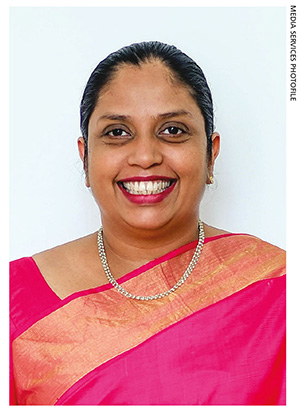ICT INDUSTRY
Compiled by Savithri Rodrigo
WOMEN OVER THE FIREWALL
Lakmini Wijesundara pushes ICT pioneers to break through the barriers
Q: Why isn’t there greater female participation in ICT industry leadership?
A: ICT is often branded as being male dominated with few women in high-ranking roles. Recently, I watched a TED talk titled ‘To Raise Brave Girls, Encourage Adventure’ by Caroline Paul who said girls are oriented to be careful and not take risks, while boys are inclined to take risks and not be shy.
This inherent trait could be a reason for females not reaching higher places.
 Q: So what key challenges do women face?
Q: So what key challenges do women face?
A: The challenges are not the same for all females. Those in rural areas require higher education, confidence building and awareness opportunities. The social structure also matters. Affluent circles enable more freedom of choice for women to pursue careers with greater ICT awareness; those in underprivileged or low to middle income social circles enjoy less freedom. The landscape is different for corporate leaders in ICT compared to founders and leaders who enjoy ownership. Corporate leaders join the workforce at executive level and move up to senior management or board level. Founders create their destiny and women prefer to run their own business as SMEs perhaps due to family commitments.
Q: And how are these issues being addressed?
A: Programmes led by the Export Development Board (EDB) and Sri Lanka Association of Software and Service Companies (SLASSCOM), as well as The Information and Communication Technology Agency’s (ICTA) Smart Social Circle programme, drive ICT awareness at the rural level.
There is also a need for a mindset change. Among affluent females, encouraging and demonstrating the benefits and importance of being part of the workforce is vital. Some women may choose not to pursue leadership roles or entrepreneurship. In Sri Lanka, females do not seem to face a glass ceiling except in their own minds. Those with a typically rural upbringing may be held back by a lack of fluency in English.
They must be encouraged to be brave, take risks and gain confidence. National awards and programmes that build confidence with access to funding are important.
Q: How can women avoid this quagmire?
A: They must realise that these are years of pioneering efforts and any achievement will be benchmarked – and this will turn them into role models for females to emulate. And they must be encouraged to pursue their dreams.
A confident mindset plays a major role in empowering women followed by networking – and both factors lead to success. Assistance to enrol more females into ICT leadership is a priority and the ball is now in their court.
Q: Do women receive less funding than their male counterparts?
A: Preconditioned mindsets can’t be changed overnight but women should not be disheartened. Instead, they must prepare their best pitch, deliver it to the best of their ability and aim to win. The Lanka Angel Network (LAN) and others encourage female entrepreneurs to participate in funding and mentoring programmes. Having recently attended a LAN female sponsorship programme, I find positive momentum and collaboration in them.
Seek available funding and forget irrelevant trends. Create a company that obtains funding, generates results and charts its own course.
Q: Can Sri Lankan companies share the global stage with the likes of Facebook, Amazon or Tesla someday?
A: Anything is possible. MillenniumIT showed us that the world’s quickest stock exchange solution can be built by Sri Lankans. WSO2 middleware drives some of the largest transactional systems. Virtusa’s innovation in processes and productivity improvement places it on a par with global giants. And IronOne’s BoardPAC solution runs board and executive meetings of over 1,000 Fortune 500 companies.
These world-class solutions are created from Sri Lankan talent.
Q: So what’s holding the industry back?
A: Reaching the global stage is more difficult when one is located outside mainstream regions where commerce and transactions take place in large volumes.
However, nothing stops us from implementing strategies and being present in such regions to play a part in their distribution and fund generation processes. It is more difficult but with perseverance barriers can be broken – and when pioneers break barriers others will follow.
More assistance is required to help bridge challenges reminiscent of Silicon Valley or other hotspots in developed countries and enhance the country’s branding, which the ICT industry is implementing. And ICT industry leaders must share success stories and strengthen brand power to gain foreign investor confidence.



